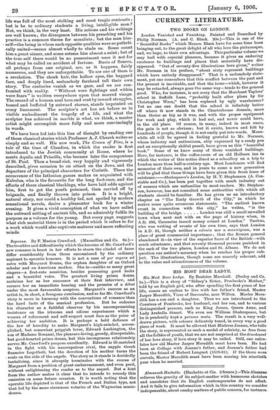Soprano. By F. Marion Crawford. (Macmillan and Co. Ga.)- The
troubles and difficulties by which the heroine of Mr. Crawford's new romance is beset in her efforts to storm the citadel of fame differ considerably from those encountered by the ordinary aspirant to operatic honours. It is not a case of per aspera ad astra with Margaret Donne, the orphan daughter of an Oxford scholar and an American mother. She is—unlike so many great singers—a first-rats musician, besides possessing good looks and a beautiful voice. The greatest living prima donna acclaims her as her successor at their first interview, and secures her an immediate hearing and the promise of a debut under the most favourable auspices. Margaret's success as an artist is, in short, a foregone conclusion, and so far Mr. Crawford's story is more in harmony with the conventions of romance than the hard facts of the musical profession. But he redeems his character as a faithful observer by his uncompromising insistence on the irksome and odious experiences which a woman of refinement and self-respect must face as the price of achieving her ambition. It is perhaps a bold defiance of the law of heredity to make Margaret's high-minded, accom- plished, but somewhat priggish lover, Edward Lushington, the son of Madame Bonanni, the pleasure-loving, greedy, disreputable, but good-hearted prima donna, but this incongruous relationship serves Mr. Crawford's purpose excellently. Edward is ill-matched in the fight with his unscrupulous rival, the supple Greek financier Logotheti, but the devotion of his mother turns the scale on the side of the angels. The story as it stands is decidedly tantalising, since it abruptly terminates with the rescue of Margaret from a position of great embarrassment, and even peril, without enlightening the reader as to the sequel. But a hint from the author makes it clear that he intends to remedy this omission on some future occasion. It is worth noting that the operatic life depicted is that of the French and Italian type, not that led by the more strenuous votaries of the Wagnerian music- drama.


















































 Previous page
Previous page